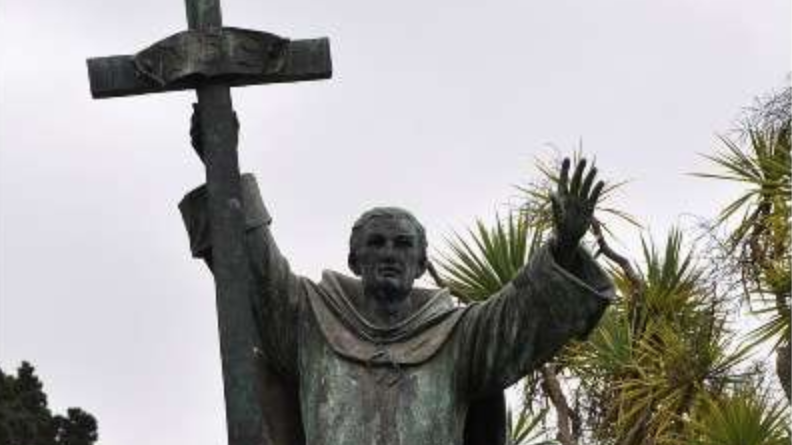A statue of Catholic missionary St. Junípero Serra was toppled in a San Francisco park Friday, along with statues of Francis Scott Key and Ulysses S. Grant.
The statues were torn down Friday evening from Golden Gate Park, by a group of about 100 people.
Activists just toppled the Junipero Serra statue in Golden Gate Park here in San Francisco
Now they’re onto Francis Scott Key, slave owner and writer of the Star Spangled Banner pic.twitter.com/Ykv0hFMZvK
— Joe Rivano Barros (@jrivanob) June 20, 2020
During the eighteenth century, the saint founded nine Catholic missions in the area that would later become California, many of those missions would go on to become the centers of major California cities.
Serra helped to convert thousands of native Californians to Christianity and taught them new agricultural technologies. The statue in Golden Gate Park was first placed in 1907, and was crafted by well known American sculptor Douglas Tilden.
Critics have lambasted Serra as a symbol of European colonialism and said the missions engaged in the forced labor of Native Americans, sometimes claiming Bl. Serra himself was abusive.
But Serra’s defenders say that Serra was actually an advocate for native people and a champion of human rights. They note the many native people he helped during his life, and their outpouring of grief at his death.
Biographers note that Serra frequently intervened for native people when they faced persecution from Spanish authorities. In one case, the priest intervened to spare the lives of several California natives who had attacked a Spanish outpost.
In one letter urging fair treatment of native people, Serra wrote that “if the Indians were to kill me...they should be forgiven.”
Los Angeles Archbishop José H. Gomez said in 2015 that Serra had “deep love for the native peoples he had come to evangelize.”
“In his appeals, he said some truly remarkable things about human dignity, human rights and the mercy of God,” the archbishop added.
In 2017, Gomez praised Serra as an overlooked American founder.
“Remembering St. Junípero and the first missionaries changes how we remember our national story. It reminds us that America’s first beginnings were not political. America’s first beginnings were spiritual,” Gomez said in a 2017 homily.
Pope Francis canonized the Franciscan missionary Pope Francis in Washington, D.C. on Sept. 23, 2015.
“Junípero sought to defend the dignity of the native community, to protect it from those who had mistreated and abused it,” the pope said in his homily at the Mass of canonization. “Mistreatment and wrongs which today still trouble us, especially because of the hurt which they cause in the lives of many people.”
“Junípero Serra left his native land and its way of life,” the Pope continued. “He was excited about blazing trails, going forth to meet many people, learning and valuing their particular customs and ways of life. He learned how to bring to birth and nurture God’s life in the faces of everyone he met; he made them his brothers and sisters.”
In 2018, San Francisco’s city government removed a statue of the saint from a prominent location outside City Hall. A statue of the saint remains displayed in the U.S. Capitol.
Around the country, protestors and rioters this week have pulled down statues of historic figures. While some protests have torn down the statutes of Confederate figures, as part of a call to end systemic racism, other figures have also been turn down from prominent locations, including George Washington.
Grant, whose statue was removed, urged ratification of the 15th Amendment, which assures African-Americans the right to vote, and in 1870 created the federal Department of Justice in order to prosecute the Ku Klux Klan.

